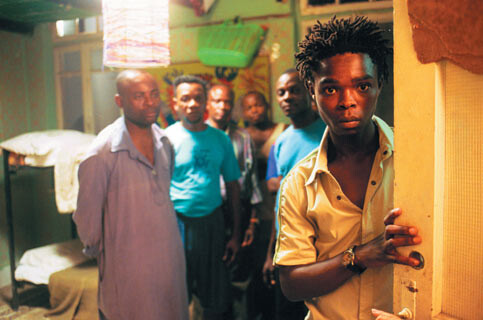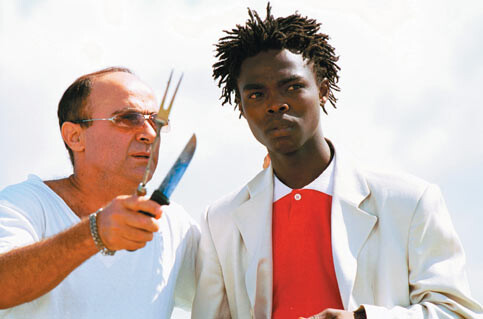The Electronic Intifada 19 March 2004

James (Siyabonga Melongisi Shibe) in the migrant workers’ apartment
If the purpose of a pilgrimage is to reawaken or reaffirm one’s spirituality, James, the title character of the new Israeli film James’ Journey to Jerusalem, certainly does that. However, the idealistic young African’s journey is fraught with unexpected and difficult detours, putting his faith on trial as he becomes seduced by consumerism and power.
Soon upon his arrival to Israel, James learns that the “promised land” he sung about in his village’s church is not just about brotherly love and milk and honey. While waiting to be processed at the Tel Aviv immigration office, he stares at a poster of Jerusalem. The apathetic young clerk shuffles through his papers and dismisses his story of wanting to come to the Holy Land, explaining that she’s heard it 3,000 times before. When he asks her if she’s a Hebrew woman, she barely looks up from her desk to say, “I know you came here to make money.” This conversation is premonitory of James’ later struggle with money and his Christian beliefs.
James ends up in a jail cell with other illegal migrant workers, but then by a stroke of luck is “rescued” by the warden’s brother, Shimi, who pulls people like James out of jail and puts them to work, exploiting them like indentured servants. James, in his colorful African dress, and Bible in hand, stands out in the bleak, cramped apartment he must share with several other African workers. Here James learns a new word, “gummi,” which means cleaning, as Shimi, who is uninterested James’ desire to go to Jerusalem, tosses a bag of mop heads at him.
Other important words James learns on his journey are “frayer” (sucker) and “hafif” (slacker). James eventually abandons his Christian ethics in order avoid either labels, although his conflict in doing so is readily visible. James, the good-natured African villager, learns how Zion really works thanks to his two teachers in Israel, fellow worker Scomboze and Shimi’s father, Sallah.
Upon his first payday, James rejects the money that Shimi tries to give him, and says, “It is easier for a camel to go through the eye of a needle than a rich man to enter the kingdom of heaven.” But Scomboze introduces James to the shiny new world of consumerism, and they go to the mall, buying sneakers and trendy clothes. Soon enough, James carries a cell phone rather than his cross and bible.
James is shown how to get ahead by Sallah, a Sephardic Jew who alternates calling James “Reverend” or “Blackie.” Sallah, who is under pressure from Shimi to sell his land and move into a retirement home, discovers James’ remarkable luck at throwing dice as they play backgammon. He then invites his “frayer” friend over, fakes an arm injury, and gets James to roll the dice for him, reaping a nice profit and angering his friend upon winning. James is uncomfortable with this, even though Sallah cuts him in on the deal.
The allure of consumerism prevails, and James starts moonlighting, making more money (not realizing that although these side jobs pay more money that he gets from Shimi, he’s still being ripped off), and buying new things. The pastor of James’ church notices James’ disappearance on Saturdays (James is expected to work on Sundays so he must worship on Saturdays), but counsels that all will be well in the eyes of the lord if James donates enough money for dresses for the church choir. The pastor explains, “Sometimes, son, when you think about money, you think about the lord.” James replies, “Amen, father, amen.”
The closest thing to a garden in the desert that James experiences is Sallah’s backyard garden. However, this oasis was only created through theft, just like everything else beautiful in the Holy Land. Sallah has James dig up flowering plants from other peoples’ property, and has him swipe beds of flowers while making a getaway in his motorized wheelchair. It is from Sallah that James learns the valuable lesson that one is either a “frayer” or the person who takes advantage of such suckers. Indeed, says Sallah, Jesus was a “frayer,” as he demonstrates by lifting his arms in crucifix form. And who benefits from Jesus being a “frayer,” but none other than the Pope in Rome, Sallah explains.

Salim Daw as Shimi (left) and Siyabonga Melongisi Shibe as James
James does get his opportunity to go to Jerusalem. Shimi, impressed by James’ industriousness and character, and his ability to keep his curmudgeon of a father happy, gives James Sunday off to go to Jerusalem, and temporarily returns his passport. However, James is inundated with his secret side jobs, and decides to make more money and put off Jerusalem for another few weeks, telling himself what he’s been told by the exploitative Israelis — “Jerusalem’s been there for 3,000 years, it’s not going anywhere anytime soon.” James, in need of assistance, adapts Shimi’s model of employment, and starts having his fellow workers at the apartment do the work for a fraction of the money that James gets as the middleman.
Things come to a blow when Scomboze starts slacking off and making James look bad to his clients. While his workers are lined up at the apartment for their pay, James praises or scolds the workers, depending on what his clients report, just as Shimi does. Scomboze, who has gotten some complaints, gets money deducted from his pay. Infuriated when Scomboze protests his pay cut, and asks, “What does it teach you in your book,” James yells, “I can’t stand you anymore!”
Although this outburst is directed at Scomboze, it is clear to the viewer that it is himself whom James can no longer stand. Sallah is also fed up with James, who has neglected to complete his duties at his house in order to complete his side jobs. Sallah kicks James out of his home one afternoon, after Scomboze breaks Sallah’s late wife’s mint pot, and James blows up at him.
The film comes back full circle when Shimi asks James to pick out three men from the jail cell being watched over by his brother Ezra. The camera shows James with the prison bars in front of his face, as though it were James himself who is incarcerated. The way James comes to power, by exploiting other people the way Shimi exploits him, recalls Frantz Fanon’s writing, when he warns that exploited people must take care to not forget their social ideals when seeking independence, lest they emulate those who exploit them, and become the problem themselves.
And while James is at a family party hosted by Shimi and his wife Rachel, celebrating the sale of Sallah’s property for a million dollars, James decides that he has had enough of this life of cheat-or-be-cheated. Disgusted with how Shimi treats his father, and disgusted with how all of his relationships have been compromised by greed, James reveals to Shimi how he has been moonlighting, and starts throwing money at him. He tells how Rachel’s friend Rheuma has been having him work under the table, and starts throwing money at her, moments after she brushes off his friendly hello, presumably because she’s embarrassed to be considered a friend of an African man. Shimi has his brother Ezra arrest him, and James is to be deported from the Holy Land.
But instead of going back to the Tel Aviv deportation jail cell, he is taken to Jerusalem, where he is allowed by the police to have his picture taken. James does make it to Jerusalem, and his faith does pass this weighty trial. And while he explains to the police, “When I tell my people about this place, they won’t believe me. They’ll be angry with me,” it is clear that James has gained valuable wisdom regarding the seduction of money and power.
Although the film is plagued with technical problems, its worth lies in the complication of its characters. Sallah, who resorts to racism as a defense mechanism, cannot be dismissed as a racist old Zionist. Cursing in Arabic while playing backgammon, the reader realizes that he too was on the undesirable end of racism, as a Sephardic Jew considered second-class by Ashkenazi Jews in Israel. In the end, next to James, Sallah is the most sympathetic character, speaking to the complexity of the film’s story, which is laced with smart humor and irony.
Also indicative of the film’s success, the story is not particular to Israel (although the contradiction between the Biblical imagery of Zion and the gritty reality of urban Israel is). The allegory of power, consumerism and religion is a universal one, and the microcosmic representations of racism and conflict can serve on a macrocosmic scale to that other conflict that comes to mind when people think of Israel.
Related Links:
Maureen Clare Murphy is an Arts, Music, and Culture correspondent for The Electronic Intifada and its sister site, Electronic Iraq.




